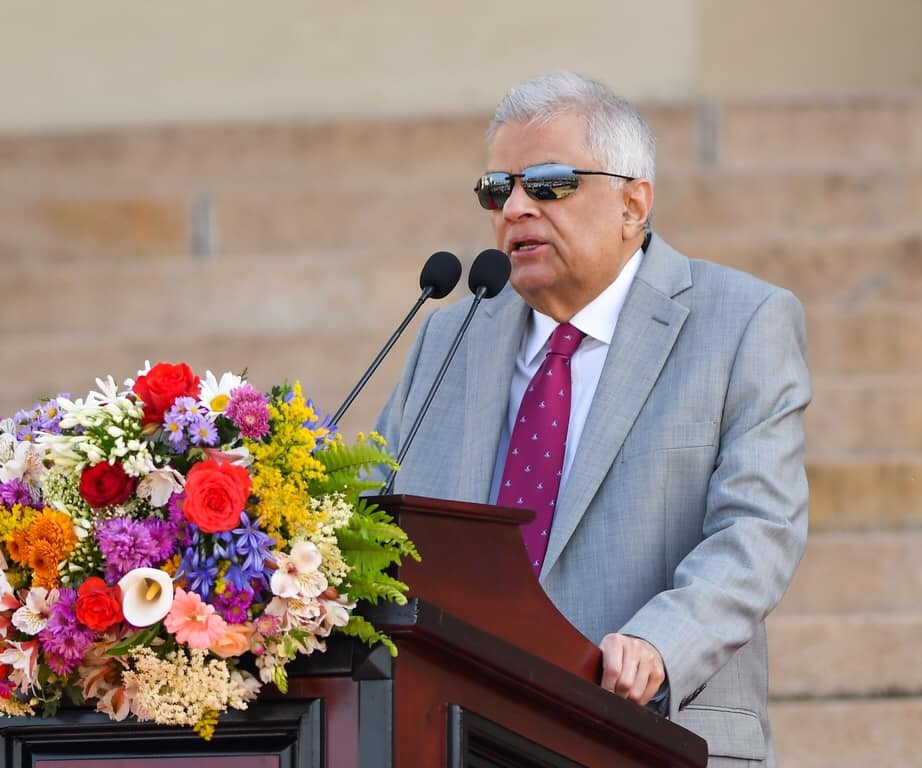President Ranil Wickremesinghe, participating in a high-level panel discussion at the Global Leaders’ Summit for a New Global Financing Pact in Paris yesterday (22), discussed the country’s experience with debt restructuring and the need for a comprehensive approach to address the challenges faced by middle-income nations.
He said Sri Lanka faced limited access to financing and took ownership of its debt and economic restructuring programme. The president emphasised the need for timely and automatic access to concessional financing and highlighted the high costs incurred during the process. He also called for improved interaction between creditors and debtors and suggests a new approach to address geopolitical issues.
President Wickremesinghe emphasised the urgency of restructuring to avoid instability and advocated for a separate process for middle-income countries to address their unique challenges.
He expressed gratitude for the IMF’s intervention and Sri Lanka’s coordination, which allowed dealing with both creditor groups. Ongoing negotiations with Japan, India, and China regarding Integration and development programmes also aided the process. However, President Wickremesinghe highlighted the need for improved interaction between the committee and debtors during the restructuring process, suggesting that a new approach is necessary.
Following is an excerpt of the question posed by the Moderator, First Deputy Prime Minister of Spain Nadia Calvino at the panel discussion and the response by President Wickremesinghe
Q. So, President Wickremesinghe, you are in a somewhat special situation. We now live in a middle-income country. The coordination challenges are perhaps greater in the sense that you are not subject to the common framework, which is hard to be an important instrument in the case of Chad. The official creditor committee has been formed with the Paris Club and non-Paris Club members, and we understand that India’s decision to participate and co-chair this creditors gathering is a major milestone. So what is your view about the restructuring process, and what do you consider to be the main bottlenecks?
We have already heard from the President of Chad that We need to reduce bureaucracy, and we all agree on that. Simplification is sometimes the most
complex thing to achieve. But we are very interested to hear your experience in this regard.
A. When Sri Lanka was declared bankrupt as a middle-income country, we were not eligible under the common framework for debt restructuring. We had limited access to concessionary financing, and there was a complete loss of external financing. Therefore, Sri Lanka’s response was to take ownership of this programme, both for debt restructuring as well as the economic restructuring needed for growth. Then we negotiated our conditionality with the IMF and the creditors.
So, it’s like we were working on a menu, and the argument was about what items should get on it. And what are the items that could be taken off? I think we actually had an agreement about 90% of the items So, we own it as much as the IMF does. Of course, we had two exceptional situations.
One is that India came to our aid, and that was nearly four billion US dollars available when no other sources of funding were available. Secondly, through the World Bank and the ADB, we went through the process of reverse graduation.
So the gain became entitled to concessionary funding. But from the time we declared ourselves bankrupt, there was a delay in bureaucracy on both sides. We delayed, and if we had funding by May, the upheavals of July could have been avoided.
But anyway, we had the upheavals of July. We went in immediately as it settled down.
In September, we had a staff-level agreement, but it took us another six months for the agreement to come before we get any monetary assistance.
So, we undertook significant economic reform that imposed pain on the population but without any predictability. This is the problem we have. I would say, given the increasing vulnerabilities facing middle-income nations, MIC’s access to concessional financing must be viewed from a broader perspective. That is, access to an automatic and timely payment under an agreed criterion. If you fulfil the criteria,
Secondly, I agree with how President Acharya defined it. We could have done it much faster. We paid the debt. The staff-level agreement came last September. By November, we had the climate prosperity plan, which we announced at COP 27. Now, it’s been followed up by Sri Lanka’s growth agenda for a highly competitive green economy. So our financial needs, both official and private, have virtually quadrupled. That’s a problem others also have to face. Then I would say following the conclusion of the negotiations with the IMF and the successful approval of the Extended Fund Facility (EFF), we have had no roadmap to follow regarding the next phase of debt restructuring. So before we can get the next tranche from the IMF, it’s a question of us now mapping the road out.





